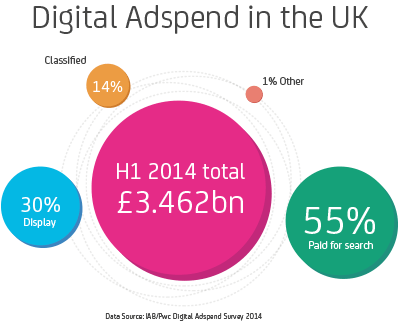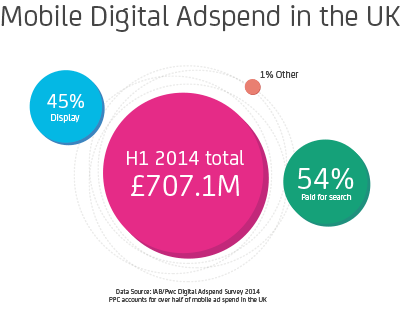PPC is still the biggest single area for digital advertising, despite growth in display and social media, and accounts for 55% of overall spend. With the top spots taking up an increasing amount of search engine real estate and making competition for them more fierce, it’s more important than ever to laser target PPC ads to the right audience.

Businesses who don’t keep up with the latest trends in keeping campaign focus on rapidly evolving customer behaviours, risk losing out to savvier competitors.
Mobile search and changing device use is one area that needs careful attention in order to serve the right ads to the right people at the right time. Focusing on conversion tracking and filtering that data for insights on user intent and messaging gives you the information to refine campaigns.
How mobile friendly is your PPC?
This doesn’t just cover using mobile friendly ad copy. True mobile friendly PPC can only grow from a website that delivers good user experience once they’ve clicked through from the advert.
It’s no longer an area that marketers can afford to neglect; British adults spend over an hour a day on their smartphone and a third of people use their smartphone for shopping. And we’re increasingly living in a multi-screen world.

32% of screen time is from users utilising more than one device and most of those are looking at unrelated content, for example browsing for holiday information or a new pair of shoes while streaming a TV programme on a laptop.
If a website isn’t optimised well for mobile then you could be wasting money gaining clicks from users who are just going to bounce back because your website isn’t meeting their needs. The majority of mobile users will click away from a slow loading page in a matter of seconds and if a website needs to compete for attention with TV or adverts, it can be even easier to lose user interest.
At the point of conversion, up to 52% of people choose to call instead of buy online. While this might simply reflect the fact that sometimes it’s not possible to convert online, if users are using a phone to find your site it needs to be easy to call.
This can be as simple as a prominent, a clickable phone number with an appropriate call to action across each page of your site; it’s incredibly frustrating for users to realise that phone numbers are contained within images.
Reviewing call tracking data can show if mobile users have a noticeable drop off at any point in the marketing funnel. Although this could be due to users switching device it could also be that your PPC campaign isn't optimised towards this segment.
Do you know which keywords really convert?
Do you have a full picture of how keyword sets and user behaviour combine to see which terms drive conversions? This can’t always be gathered from last click attribution systems, which can miss out on accurately linking sales to top-of-the funnel keywords and can fail to account for conversions on a brand name search or on the phone.
This is why increased conversion tracking, along with adopting more mobile friendly practices, is frequently seen as one of 2015’s major trends.
Under last click attribution, it’s all too easy for a valuable, upstream keyword to look as if it’s under-performing, resulting in a diminished budget and eventually lower conversions. A holistic approach to conversion tracking that takes into account the entire user journey, from initial point of contact to purchase – including those that happen by phone – allows resources to be pinpointed at the right customers.
When TUI integrated Infinity's call tracking with their PPC campaign they realised that “cruises”, a seemingly low-value generic keyword, was in fact vital in attracting customers, even if they later converted using a different, more specific keyword.
Once you have this data on the whole customer journey it becomes easier to refine messaging to your customers’ needs. This can include ad copy for both search touch points, onsite copy and content and even using this data to inform social or display campaigns.